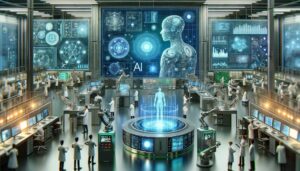Introduction to AI in Research
The integration of Artificial Intelligence (AI) into the research domain has marked a revolutionary shift in how inquiries and investigations are conducted. This transformative technology has not only streamlined complex data analysis but has also fostered groundbreaking discoveries across multiple disciplines. From decoding the human genome to exploring the vastness of space, AI’s capabilities have expanded the horizons of what is achievable in research.
Fundamental AI Technologies
At the core of AI’s integration into research are several key technologies. Machine Learning and Deep Learning algorithms have become indispensable tools for pattern recognition and predictive analysis. Meanwhile, Natural Language Processing (NLP) has transformed how we interact with vast repositories of written knowledge, enabling the automated summarization of literature and the extraction of pertinent information. Robotics, particularly in experimental setups, automates repetitive tasks, allowing researchers to focus on more complex analytical work.
AI in Data Analysis and Management
The explosion of data in the digital age has presented a significant challenge for traditional research methodologies. AI technologies, particularly in Big Data Analytics, have become critical in managing, analyzing, and interpreting vast datasets. Predictive modeling, powered by AI, has enabled researchers to forecast trends and outcomes with unprecedented accuracy, opening new avenues for exploration and innovation.
AI’s Role in Scientific Discoveries
AI’s impact on scientific discoveries cannot be overstated. In pharmaceuticals, AI algorithms accelerate the drug discovery process by predicting molecular behaviors and potential drug interactions. In the realm of space exploration, AI-assisted telescopes and rovers are exploring celestial bodies, sending back data that was once beyond our reach.
AI for Enhancing Research Methodologies
AI’s versatility extends to enhancing traditional research methodologies. By employing AI for simulation and modeling, researchers can visualize complex processes, from climate patterns to molecular interactions. Custom AI tools, tailored for specific research needs, are empowering researchers to achieve more precise and efficient outcomes.
Challenges and Solutions
Despite its benefits, the adoption of AI in research is not without challenges. Ethical considerations, particularly in data privacy and the potential for bias, necessitate a careful approach. Solutions include developing transparent AI systems and ensuring a diverse dataset for AI training.
Future of AI in Academic and Industrial Research
The future of AI in research promises even greater interdisciplinary collaboration, with AI acting as a catalyst for innovation across fields. As AI tools become more accessible and researchers more AI-savvy, the potential for new discoveries and advancements is limitless.
AI Tools and Software for Researchers
The landscape of AI tools and software for research is vast, ranging from open-source platforms to proprietary solutions. Selecting the right tools depends on the specific needs of the research, with considerations for scalability, accuracy, and ease of use.
Building AI Skills for Research
For researchers looking to integrate AI into their work, building the necessary skills is crucial. A plethora of educational resources, from online courses to workshops, are available to cultivate an AI-informed approach to research.
Case Studies: Success Stories and Lessons Learned
Real-world applications of AI in research provide valuable insights into its potential. Innovations in healthcare, environmental studies, and the social sciences exemplify AI’s role in addressing complex challenges and contributing to societal advancement.
Conclusion: The Road Ahead for AI in Research
As we look towards the future, the synergy between AI and research is set to grow stronger. The road ahead is paved with opportunities for transformative discoveries, driven by the collaborative efforts of the AI and research communities. The journey is just beginning, and the possibilities are boundless.



